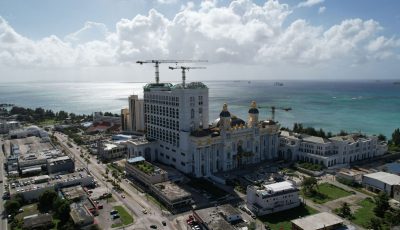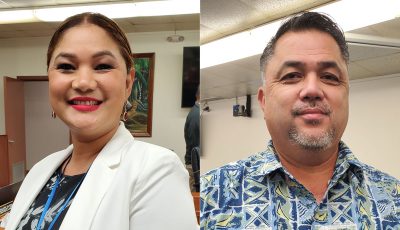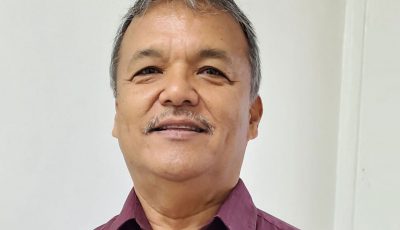House: Torres veto of casino amendments ‘unconstitutional’
The House majority bloc flirted yesterday with an override of Gov. Ralph DLG Torres’ actions last year on a bill that would have provided additional tax relief to the Saipan casino and allowed lawmakers to block casino regulators from revoking the casino’s license if found non-compliant.
During discussion yesterday, lawmakers—led by House Speaker Rafael Demapan (R-Saipan)—pulled back from the dead a casino amendment bill that had wrought controversy in both upper and lower houses late last year before it reached Torres’ desk in November.
In clear defense of its own powers, House leaders rallied on the grounds that Torres had no authority to line-item veto the bill.
In early December, then House speaker Joseph Deleon Guerrero asked House counsel John Cool for a legal opinion on Torres’ actions. The lawyer got back to him on Dec. 28, with a memo essentially declaring Torres’ line-item vetoes inappropriate, arguing that bill was not an appropriations bill—as Torres deemed it—and therefore outside the mark of the governor’s veto pen.
In reviewing the bill, Torres had vetoed three concerns: provisions to allow a legislative veto over a potential casino license revocation; mandate that casino employees be declared essential in case of austerity or government shutdown; and allow tax credits for the Saipan casino if they passed a certain tax threshold. However, some House leaders believe two provisions—to provide for a tax relief for the casino and provide legislative oversight in such an event that regulators chose to revoke a non-compliant Best Sunshine International, Ltd.—were policy calls that should be made by their body.
“[Torres] cannot pass the bill and veto it at the same time,” said Demapan during session yesterday. “This is something we can’t ignore.”
Demapan and Rep. Antonio Sablan (Ind-Saipan) laid out three options for the House yesterday; to override the law; pose the issue as a certified question to the Superior Court; or allow law review commission to issue its position.
The recent law poses “ramifications for future administrations,” said Sablan. “We just can’t sit back and can’t do anything about it,” because it would set “precedence for future administrations” on how it can treat bills that come out of the Legislature. The bill “should not be subject to the constitutional authority for line item veto,” Sablan said.
In reading from Cool’s opinion, Deleon Guerrero said the three vetoed items in contest were “not appropriation provisions, they were regulatory provisions.” He said—if the bill was indeed an appropriations bill—then the $3 million earmarked to Saipan gaming regulators to fund their office and staff would lapse at the end of the fiscal year. “That was not the intent” of the bill, Deleon Guerrero said, noting that the earmark was intended to be provided on annual basis. “This thing has to be clarified,” he said.
On the option to override the bill, Sablan noted that the Senate has not scheduled a session until after the deadline for override—Feb. 4—which meant that an override would be moot since it needs the action of both houses.
Still, Sablan said the matter must be taken seriously. “We have a difference of opinion,” he said.
Rep. Joseph Leepan Guerrero (R-Saipan) said he was in communication with the law commission and was told that their counsel issuing an opinion that was supposed to be given on Monday. “They want to issue an opinion,” Guerrero said.
Cool argued that if the bill were an appropriations bill then it would not be codified. “We would need to re-enact” it’s sub provisions, he said.
An appropriation bill should be limited to the subject of appropriations, Cool said, and the issue at hand was “very appropriate subject” for a certified question in Superior Court. “…Because it involves a dispute between the Legislative Branch and the Executive Branch” and “reviewing the governor’s authority to exercise line-item vetoes,” Cool said.
Too little, too late
Some lawmakers later called the discussion a waste of time, as the hour-long tease of an override amounted to a decision to send a letter to the law review commission to raise the issue.
The item discussed was also not originally scheduled on the day’s session but pulled from an official communication item from Torres months ago.
Some minority block lawmakers threw some wrenches into the discussion, asking why the issue had not been raised in the handful of sessions they held over the last two months.
“We are now in February,” Rep. Blas Jonathan “BJ” Attao (Ind-Saipan) said. In response to these concerns, Demapan pointed to the untimely passing of the late governor Eloy S. Inos. If a certified question was poised and the law rendered “null and avoid,” Attao asked, would the casino commission have to pay back what they’ve been paid already?” “[The bill] never became law,” Attao said.
Cool, though, stated that the commission employees would not be affected. He said “they are covered” and this would not be problem since the governor had no authority to veto the bill’s provisions. The bill “would have become law without the governor’s signature assuming actions violate the Constitution,” said Cool, referring to the 40-day window for Executive Branch action.
Frustrated with the debate itself, Rep. Ramon Tebuteb (Ind-Saipan) said the real issue was “due diligence.” The casino amendment issue has been around since last June, he pointed out, a substitute bill was pushed on the floor during an “emergency session” in August and then “fast tracked,” with no committee report, and “sailed smoothly” to the Senate. Senators passed the bill after some amendments to satisfy public health official’s concerns, and then recalled the bill after Attorney General Edward Manibusan sounded his concerns about provisions he thought would give undue powers to casino regulators.
He said if an override were pressed to the Senate, it would be “a very slippery slope.” “This is symptomatic of a rushed casino bill,” Tebuteb later told reporters.
But Vice Speaker Deleon Guerrero said past House or Senate action was not the question. “It is the governor’s action.” “If we keep quiet…what’s to prevent a governor in the future to veto a non-appropriations bill?” Deleon Guerrero asked.
“If [an override] simply sends a message that this is not right at least it sends a point,” Deleon Guerrero said.
He stressed the need to raise the issue “so we do not turn a blind eye.”
Rep. Ed Propst (Ind-Saipan) noted Cool’s opinion was made over a month ago—Dec. 28—and asked that information with the minority bloc be shared despite their divisions. On Torres’ line-item vetoes, Propst said, “I don’t think that’s necessarily a bad thing.”



























